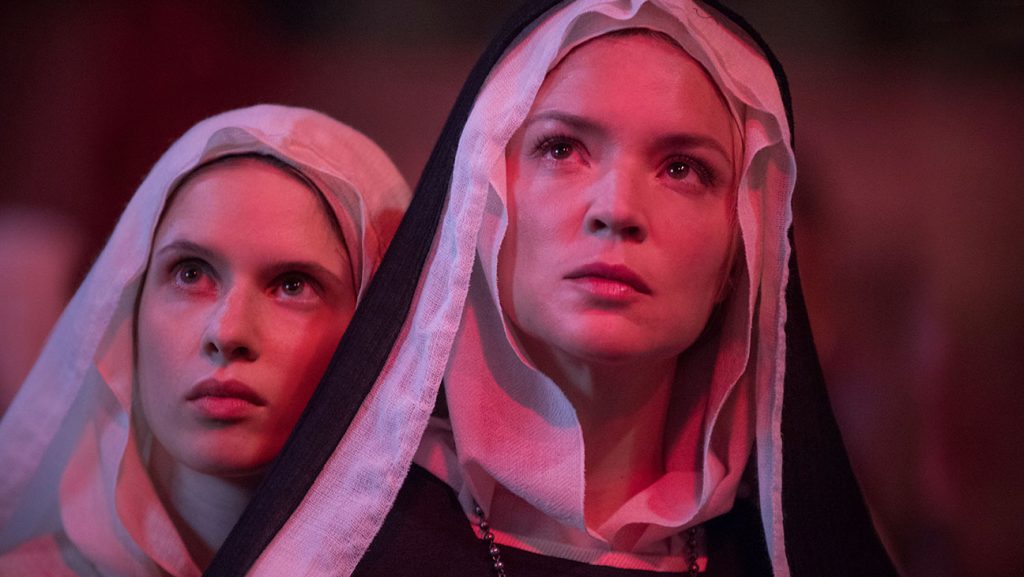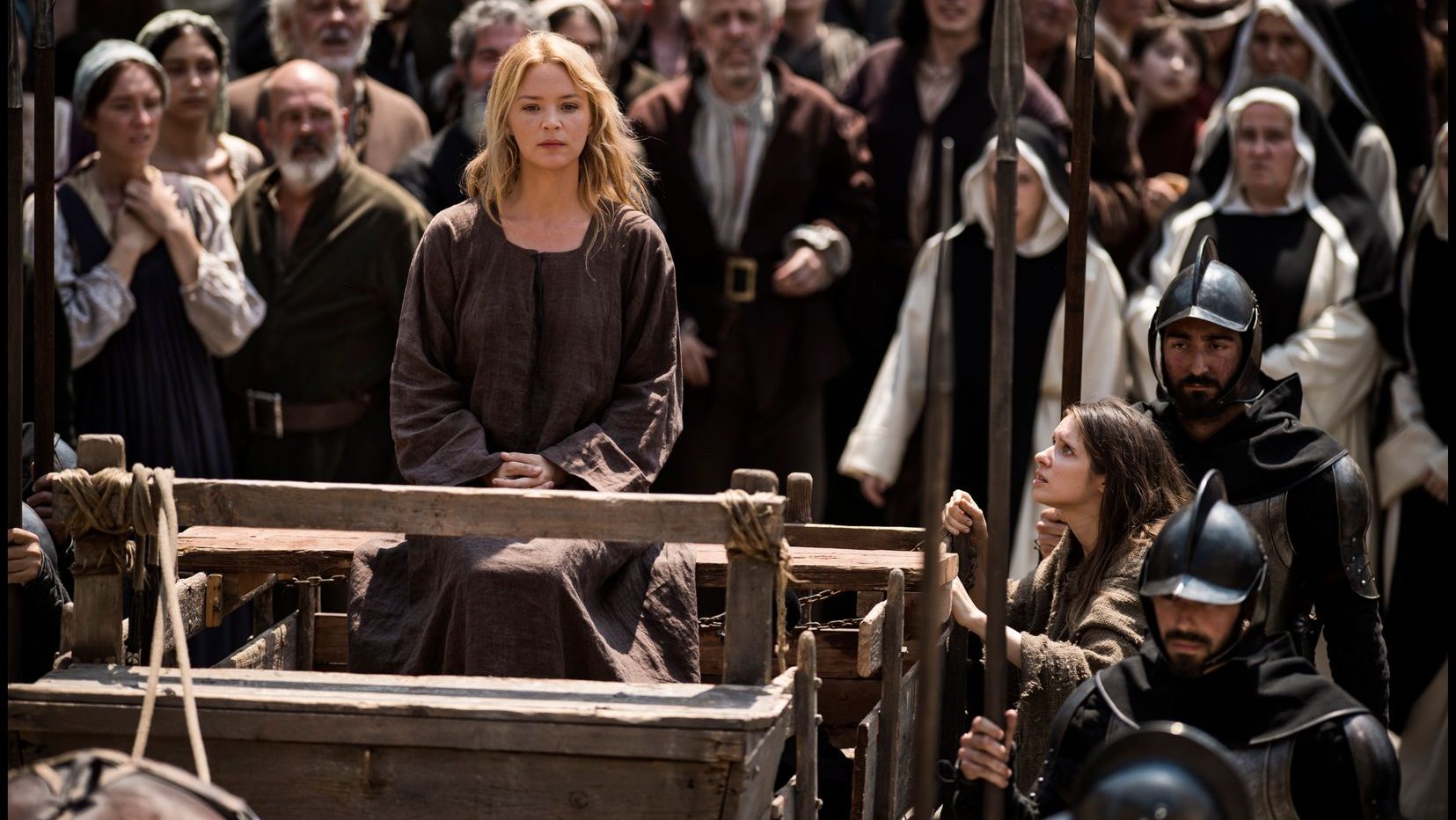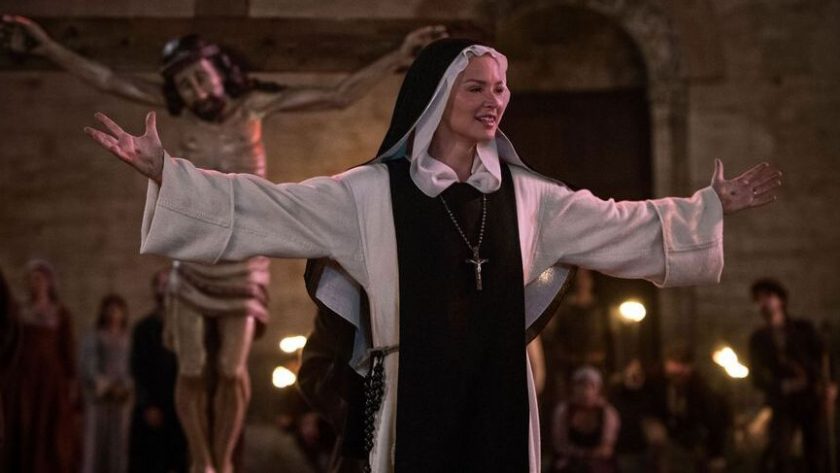BFI’s London Film Festival is in town! The FilmSoc Blog is back for the 65th edition of the city’s largest film festival, delivering a look at the hits and misses of the 2021-22 season.
Alexia Mihaila reviews the parodical catholic and sapphic drama of a delusional nun, turned prophet, Benedetta. Now premiering at the BFI London Film Festival!
At first I thought Paul Verhoeven made a parody about the extent of people’s religious beliefs, taking into consideration his previous interest in Jesus and his notoriety for over-sexualised imagery (Basic Instinct, 1992), labelling Benedetta as a drama rather than comedy. But, in fact, the true story of Benedetta Carlini is in itself raw comedic material. That being said, Veerhoven can be blamed for the over-sexualised and hyperbolised means of telling the story of a delusional sapphic nun, turning it into a sexist and clumsy erotic drama.
Idolizing Virgin Mary since birth, Benedetta (Virginie Efira) has grown up thinking to be Jesus’ wife. Maturing, she starts having ridiculous fever-dreams with Jesus as her saviour, where she is getting strangled up by jet-black snakes, for being lustful, which Jesus slays with a sword akin to Saint George slaying dragons, to getting shot an arrow through her by some mavericks, whom Jesus violently slashes the heads off, to getting asked by Jesus to fully undress for him and realising he has female genitalia. The film is driven by absurdity, portraying the lead as a self-proclaimed saviour who recieves holy messages through stigmata, like Jesus on the cross. Altough both the viewers and the audience question Benedetta, her naive overconfidence makes most fall prey to her delusions, even when there’s proof she faked the stigmata by cutting herself.

One experiences multiple layers of Dante’s Inferno while monitoring the convent Benedetta was raised in. The Abbess (Charlotte Rampling), is greedy and fraudulent, asking for money to admit anyone in, including Benedetta when she was little, as if the church were some private school. Heresy is also predominant because all priests and abbesses made politics out of religion, deciding on their own what is punishable and what is not. In fact, if Benedetta would have not convinced everybody that she is a prophet, hence an unappointed ruler in her town, Pescia, she could have gotten away with dating Bartolomea (Daphne Patakia) – the girl she takes in, protecting her from her abusive, incestious father. The church also dictates which icons and statues to pray to, suggesting Benedetta’s wooden figurine of Virgin Mary would have been inappropriate.
As an audience, it’s hard to believe Benedetta because her actions never match her prophetic words and even when they do, it seems staged. She preaches in demonic tone the words of the Lord, mockingly referencing the actual Benedetta who thought she was possessed by a male angel, Splenditello, who encouraged her to act sexually towards Bartolomea. She devises the belief that “shame does not exist under the protection of God’s love” and she felt loved by God, being shameless and cynical in the entirety of the film. As a ‘prophet’ she never does anything for anybody but herself. She feels liberated through the power allegedly invested in her by Jesus but she’s sinful, despite being fully convinced she has never sinned, hurting Bartolomea on purpose by asking her to pick silk bolts out of boiling water, lying to the Abbess, and being sexually active without any remorse.

The male gaze is strikingly predominant throughout with a lot of unnecessary nudity, resembling bad pornography scenes, focusing on breasts from the promotional poster of the film to every lustful scene of Benedetta. The film doesn’t focus at all on emotion; the actresses have almost no chemistry together and their relathionship is fast-paced from their first interaction. I understand the symbolism behind breasts- to depict the sexist nature of religion, and how Benedetta is Jesus’ wife, a virgin, a mother- but scenes such as when she self-pleasures while arguing with Bartolomea and asks her during the argument to reveal “at least one” breast seem hurtfully comical and add to the unsound and unnecessary absurdity of the film. As a historical piece, it is surprisyingly accurate, but heavily exagerated. For example, when Benedetta says “Jesus gave me a heart too big for my chest” to Bartolomea, that was real; then when she adds “feel it” at the end, that is just Veerhoven’s perverse directorial notes.
As an allegory to religious practices and beliefs, the Dutch director manages to show how the apex of most believers is on their deathbed and that everybody sins. Phony prophetic Benedetta sins, the Abbess sins, the priest sins and at the end of the day, we all die and we don’t even know whether heaven or hell are real. The Abbess never believed Benedetta until her last breath, which was a gesture of resignation rather than belief, because Benedetta saw Jesus in her dreams and according to her, “no miracles happen in bed.” As the Abbess is struck by the plague, her last hope to go to heaven is to trust Benedetta and scheme with her in her elaborate lie of escaping from being burned at stake. The two suicides of the Abbess and her daughter were driven by disbelief in Benedetta, themselves, but most importantly God. The Abbesses daughter jumps off the cavenent because her mom chose to side with Benedetta instead of her and the Abbess throws herself into the stake’s fire as a sacrifice to purify her sins, knowing she would die anyway.
Benedetta is a ritual of irony and an ode to the precants of the lord who mindlessly devote their body and soul to Jesus. Hit or miss? Depends on who answers; if you love watching strange dramedies, this film might be for you, but for most Benedetta would be an unbearable two hours and eleven minutes to digest.
Benedetta out 25 March 2022:




